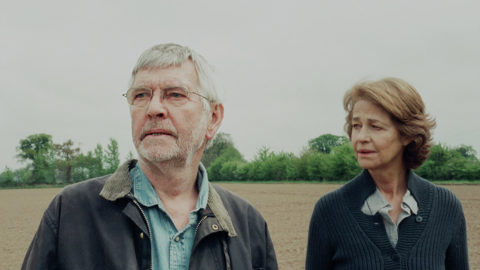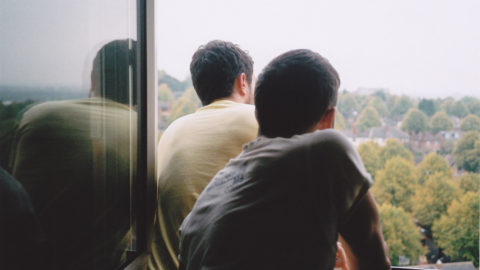Interview: Andrew Haigh
Every relationship is a story that two people agree to believe. In Andrew Haigh’s 45 Years, we witness just how fragile that story can be. The director’s follow-up to Weekend (11) stars Tom Courtenay and Charlotte Rampling as Geoff and Kate, a couple who have spent the better part of their lives together, now comfortably enjoying their twilight years in a small provincial English town where she taught elementary school. Theirs is a happy, childless marriage; the most serious infidelity is the occasional cigarette Geoff sneaks in the backyard, despite his heart surgery, which delayed their anniversary five years earlier. As the film begins, they are getting ready to celebrate their 45th with a party Kate has organized for all their friends.
One morning, a letter arrives in the mail for Geoff. The body of Katya, his former lover, has been found perfectly preserved in a Swiss glacier. She was lost during a hiking accident with him in the early 1960s. The uncanny discovery unsettles Geoff, and as he grapples with this (literal) ghost of his past, Haigh shifts our attention to Kate, who finds the event unexpectedly difficult to get over. Smart and self-aware, she understands that it’s absurd to feel jealousy for her husband’s long-dead ex-lover. And yet she does.
With 45 Years, Haigh has crafted an exquisitely observed, emotionally resonant mystery about the instability of identity. At first, Kate is rattled by the visible effect of Katya on Geoff, who becomes moody and withdrawn. But something larger, a more amorphous anxiety, begins to take hold of her. She finds herself questioning not just the authenticity of their marriage, but the foundations of her own self-image. Who is she? What life has she chosen? This apparently minor bump in their relationship begins to signify a fissure in the smooth shell of her life. A trip to the attic leads Kate to discover a hidden piece of Geoff’s past, further fueling her existential spiral.
The film is remarkable for treating the romantic experiences of 70-year-olds with no less urgency than that of the millennials in Weekend. If that film was about how a fling in your twenties could change the course of your life, 45 Years suggests that certainty in love is an illusion at any age. Shot on 35mm and anchored by sharp dialogue, Haigh’s latest is arguably a richer, more layered work, due in large part to the performances of its two stars, who deliver some of the best work of their careers. Rampling is especially satisfying to watch as she navigates with incredible dexterity Kate’s mixture of sophistication and vulnerability.
FILM COMMENT sat down with the 42-year-old British director, who was jet-lagged but in good spirits, at the Fairmont Royal York Hotel following his film’s North American premiere at the Toronto International Film Festival. 45 Years screens in a sneak preview on December 1 at the Film Society of Lincoln Center and opens December 23.
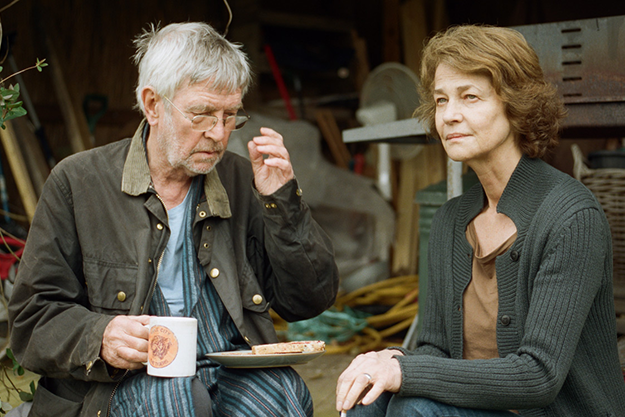
45 Years is based on a short story published this year by the English writer David Constantine. Can you talk about the origins of the project and the process of adapting it for film?
Shortly after making Weekend, I discovered a collection of short stories by David Constantine that included In Another Country, which is really the core of 45 Years. The story is quite short, only about 15 pages long, but it really struck me. I found the central metaphor of a frozen past and a potential stopped short very compelling. On one hand, the premise of finding Katya in the ice seems absurd and illogical. At the same time, it’s also believable. It feels weird in the way real life feels weird. I changed a few details in adapting it for the screenplay. In the original story, Geoff and Kate are much older, in their late eighties and it’s set in the 1990s. This meant that their past occurred during the Second World War. For the film, I made the couple younger, in their late sixties and early seventies. That shifted the backdrop of their past to the 1960s, so the context was different. The time frame of the story also changed. David’s story unfolds over several weeks, but the film takes place over the course of one week, and each day is announced on screen in a title card. I also added the anniversary party, which doesn’t happen in the book. Perhaps more importantly, David wrote the story from Geoff’s perspective, which I changed. I was tired of seeing stories told from the male point of view. I felt that surely women should be able to have romantic and existential crises, too, despite what society says!
Charlotte Rampling won the award for best actress at Berlin for her performance. She’s able to express, with astonishing economy, a whole range of emotions just below the surface. It’s the first time we’ve seen her in a multidimensional role like this for some time.
She’s been absolutely amazing in these smaller roles in films like Melancholia and Life During Wartime, but I feel that she’s become primarily known for this iciness. If you go back and watch Under the Sand, you’re reminded that there’s so much more to her. With 45 Years, I wanted to see her subtlety. The film is so much about what’s unknowable about a person. It’s about what you should and shouldn’t know about the person you’re with, being close and then being pushed away. And Charlotte can just express all of this in her face. She has an incredible sense of both giving you things and keeping things hidden. I also loved the idea of taking someone like her, who has become so iconic, and dropping her in a small provincial town in England, where she has to go down to the shopping center each day!
We see Geoff struggle to come to terms with his past, but as you said, the film really becomes the story of Kate’s inner crisis.
Kate feels threatened by the discovery of Katya. At the same time, she’s also aware that there’s something wrong with this feeling. I mean, Geoff is not having an affair. This is something that happened 50 years ago. So, it’s something else. In a way, it’s like a ghost story. Kate knows it’s not real, but she still feels the presence of this ghost, and it has a profound effect on her. I see Geoff as going through an existential crisis and then getting over it. Kate observes what’s happening to him and has her own crisis, but she’s not able to get over it by the end of the film. It becomes too much for her. Katya is like a fissure that opens up all these other questions. What is my life? What have I done? Could I have done more with it? When they are in bed together, Kate asks Geoff whether he would have married Katya if she hadn’t died. She’s wondering what on earth her life would have been like if that had happened. She wouldn’t be living where she is. She wouldn’t be doing what she is doing. She would be with somebody else. And I actually think Geoff and Kate are happy together as a couple. But this idea that your life could easily have been different is a terrifying idea.
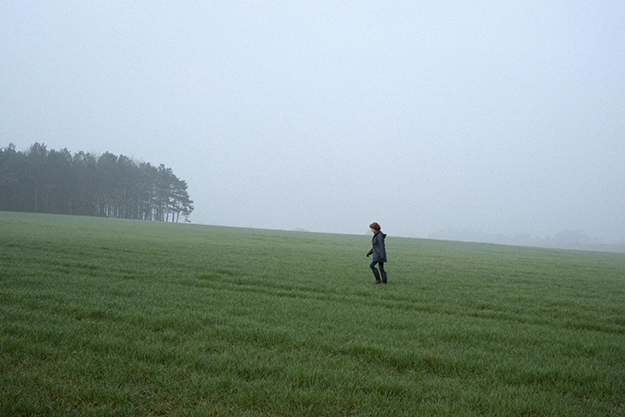
Weekend took place over two days and 45 Years plays out over the course of a week. Each film is structured dramatically by a deadline: a lover’s departure, or in this case, a countdown to the party. Can you talk about time as a subject?
Time obsesses me. It’s very hard for me to articulate why it obsesses me. It appears to stretch onward forever, but of course it doesn’t. There’s a very finite point for everything, especially for us. And things change so rapidly. Our surroundings and our identities are so fragile, so changeable. They can fall apart really quickly and it’s quite terrifying. You can go along very happily in your life, and suddenly it can just crumble away. It’s also the notion that the choices we make are so important. I wish it was possible to realize how important they are while you’re making them, but that’s not usually the case.
Prior to directing, you worked for a number of years as an assistant editor working on some big productions, including the Ridley Scott films Gladiator and Black Hawk Down. I’m wondering how this background influences how you approach making films now that you’re a director.
Working in editing, you learn the mechanics of how to develop a story over an hour and a half. For me, it was especially interesting to see what a director chose to shoot and what actually made it into the final film. In the mainstream film industry, directors tend to shoot a lot of footage and then find the scene in the edit. Even before I made Weekend, I decided that I would work the other way around. I wanted to find what was important in a scene while shooting. If I determined that a scene could be done in one shot, that’s how I would shoot it, and I wouldn’t worry about coverage. In 2009, I made a quasi-docudrama called Greek Pete that was produced very quickly. Basically, I would turn up with a camera and just film two guys improvising. The scenes usually happened in one shot, and I found this process of capturing two people interacting really fascinating. You are better able to see how two people relate when you let the camera roll. It’s the opposite of designing and editing a scene around emotional beats. Instead, it was just happening in front of you, and it was something that I wanted to try to re-create in the romantic relationships in my films.
When I used to make short films, I was always concentrating on how to direct individual scenes. Now, I think in terms of larger sequences. In Weekend, there’s a 15-minute sequence of three scenes that feels like a single scene. The two characters are in bed talking, and we shot it in three shots—wide, mid, and close-up. Shooting it this way with the idea of how the shots would work in sequence made it feel like one big scene. I know that if I shoot a scene one way, the next will likely be shot in contrast. What I am trying to do is make the whole film feel like a piece of music. In 45 Years, we don’t have a musical score to link everything together, so choosing the right shot size and blocking for each scene becomes essential in constructing the larger sequences.
Since there’s a high degree of intentionality and precision in the way you are shooting, I’m wondering whether your scripts change much during the process.
In general, my scripts don’t change dramatically once they’re written. Individual scenes tend to stay the same, but I might add a new scene here or there, if I feel that it’s necessary later on. The challenge is finding the right balance between how much you reveal and how much you withhold from the audience. This is always the hardest thing. I often write scenes that I feel will be necessary to explain things, which I then later remove in the edit.
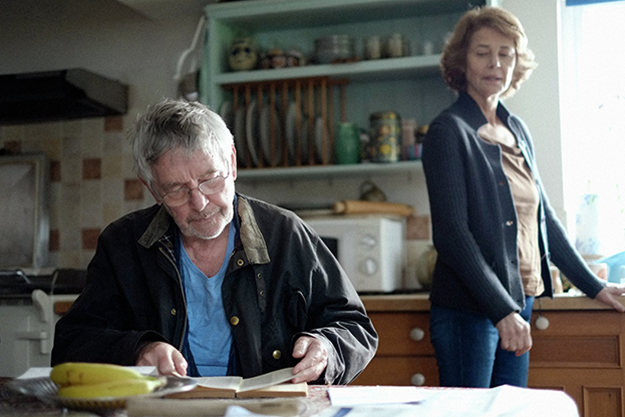
Both Weekend and 45 Years are two-handers that explore the nature of intimacy. I would imagine that you must rehearse extensively with your actors to be able to create that on screen.
I don’t do any rehearsals. I always meet the actors before the shoot and talk together about the film and the characters. I had three days with Charlotte and a couple days with Tom. We discussed our own interpretations, and about how we feel about the characters and our own lives. This helps everyone get to a very secure point, where we’re all in agreement about what we’re doing. After that, we start shooting. I don’t storyboard, but I’m very clear about what I want the blocking to be. I might take some lines out, add some new ones, or change the blocking. So, I like to work through it when the camera is on because I don’t want to miss something special.
There’s a moment midway through 45 Years when Kate expresses regret that she and Geoff never took many photos of themselves together. Later, during a critical moment in the film, she discovers a photo of Geoff and Katya that entirely changes her relationship to her own past. But it raises an interesting question about why and for whom we need to document our lives.
We can’t escape our own past, and we can’t escape other people’s pasts. It’s about our human weakness, wanting to believe that the person we’re with is dedicated to us and that we are dedicated to them. We don’t like to acknowledge that each person has a past that precedes the relationship. It’s a problem because however truthful you think you are being with someone, you are always keeping things under the surface. But maybe that’s okay as well.
I’m someone who takes lots of photos and I make albums for each year. It’s interesting to try to put your life into perspective. It’s really about my own desire to understand where my life has been and how it’s developing. Because it’s so easy to forget. Suddenly, you wonder where the last 10 years have gone. I used to keep all my letters, photos, and stuff I’d collected in boxes under my bed. But at night, I’d get freaked out thinking about my past being living underneath me. I thought about moving it to the attic, but I was afraid of having all of it above me, falling on me. Instead, I put it all in a storage unit miles away!



